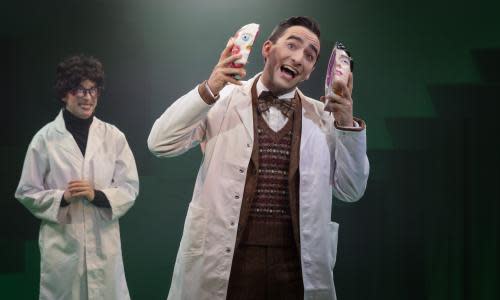Young Frankenstein review – Mel Brooks' cult classic gets clever, camp revival

It wasn’t supposed to happen like this. Young Frankenstein, director Alexander Berlage’s third musical for Sydney’s Hayes theatre – the influential home for musical theatre innovation in Australia – was due to open in November 2020. The creative team started sketching out their vision for the show in March.
Then Covid-19 hit, and everything went dark.
How do you find harmony in a story about a monster and the repressed society that births it when for months your monsters have been unseen, travelling in air particles, cutting us off from the world? Suddenly the landscape has changed, and art that is both entertainment and commentary – Berlage’s speciality – must shift along with it. Do you soothe your audience, or challenge them?
Berlage became an instant sensation with his first shows for the Hayes – giving teeth back to the Broadway adaptation of John Waters’ Cry-Baby, which had been diluted with saccharine and earnestness; and skewering the right targets in American Psycho. Berlage, in a still-young career that had previously consisted of lighting design and play directing, quickly proved a deft hand at revitalising and re-interrogating cult films through a shrewdly queer – and unashamedly camp – lens. Mel Brooks’ and Thomas Meehan’s musical – based on Brooks’ and Gene Wilders’ 1974 film of the same name – Young Frankenstein seems like a natural next step, especially as a vessel for tackling moral panics and collective anxiety.
But it also poses a new challenge: Young Frankenstein is already solidly constructed as a comedy. A new take requires freshness without over-the-top comic one-upmanship. It’s tricky, to say the least.
The show is about the grandson of the famous Dr Frankenstein, whose reanimated corpse invention became a monster who destroyed a village. Frederick (Matthew Backer) is devoted to pure science; he can’t stand to be lumped in with the family legacy. But when his grandfather dies, he must travel to Transylvania and, once there, following in those footsteps starts to seem mighty appealing …
This is a work obsessed with collective community anxiety, made within a time of collective community anxiety. How do you have perspective on new fears for onstage exploration when you’re still living in them? The answer for Berlage and his team has come with big gags and bigger punchlines. Many of those laughs do land – some of them spectacularly well – but they come at the sacrifice of nuance, and without the sting of incisive meta-comment that could have given the laughs more heft.
And there’s another concern: the show opens with a series of warnings, mostly silly – for the colour green, fake cigarettes and questionable European accents – but includes a blink-and-you’ll-miss-it acknowledgment of an attempt to correct outdated and ableist jokes from the original text. It’s a clever admission and necessary framework: this is a show that dips a toe over the line from punchline to offence with ready abandon. But even though it’s good for a laugh, hanging a lampshade on a problem (or putting a blind hermit bit character, whose blindness is the butt of the joke, into a hermit crab costume that includes novelty glasses with spring-loaded eyeballs) does not excuse or adequately address the problem.
It might be impossible to resolve the work but Berlage is at his best when he engages wholeheartedly with a problem, not trying to bury it in sight gags.
That being said, there’s a lot to like about the production. Yvette Lee’s cartoon-inspired choreography is splendidly droll, and Backer’s central performance is finely observed and full to bursting with unspoken passions. He is the clearest representation of the central thesis of Berlage’s revival: that pent-up feelings create harm. And Backer makes the extremely demanding role look effortless; he has a comedian’s timing and a leading man’s voice, and he holds the show together.
The ensemble, too, is sparking with star quality: Olivia Charalambous and Amy Hack play fourth-wall-breaking Transylvanian villagers with relish; Shannon Dooley takes a role made for Megan Mullally into an opposite but equally camp direction; Nick Eynaud’s monster offers us a glimpse of heart; Ben Gerrard’s Inga is coolly sexy and endlessly wry, a combination that feels essentially queer; Luke Leong-Tay steps up the comic pace as enabling Igor; and Lucia Mastrantone is gleefully off-kilter as the Frankenstein castle’s housekeeper.
Isabel Hudson’s set is clever, adding Escher-esque dimension to the tiny Hayes stage, and Mason Browne continues to outdo himself with a dizzying number of costumes that add up to high camp, drawing references from drag and kink to Vivienne Westwood and refined punk. Andrew Worboys directs a brash band that’s in on the joke, and keeps the show moving.
Berlage’s sharp eye for aesthetics makes the show a fun experience by default – the lights (by Trent Suidgeest) are a dream, and Berlage seems to think in colour and light as much as he does concepts – but it’s hard not to crave the intellectual depth that was so satisfying in his previous two musicals.
Like the monster itself, you can create a wholly new reality by ripping something apart and stitching it together again. This production hasn’t rearranged the guts enough to touch the sublime, and it hastily sweeps dated jokes under the rug rather than challenging them, but it still gets its hands dirty enough to offer us some of the good stuff: belly laughs and camp confection.
• Young Frankenstein is at the Hayes theatre, Sydney, until 20 March

